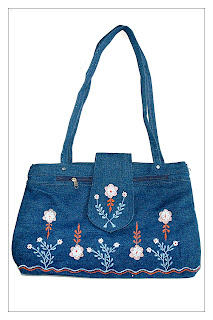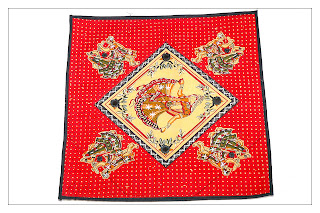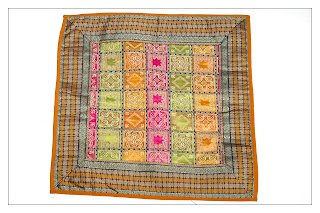Whether you are adding a dollop of fun to an outfit or a home, accessories are what provide the finishing touch—and embroidery adds the finishing touch to accessories. Bags and scarves, a sunny umbrella for a rainy day, a necktie or portfolio that sports a business logo, all these things can spell c-l-a-s-s, or provide a classy way to promote a business.
Needles and thread
Needle size is dictated by the thread and the point is matched to the target fabric. Examine the goods and use your fabric knowledge to make your decisions—the more you learn about fabrics the easier and more professional your recommendations will be.
Choose polyester thread for items that are laundered often, used outside, or get a lot of wear and tear. Have fun with rayon and specialty threads, with all their shine and shimmer, when you stitch things that will stay indoors. When the reverse (bobbin side) will be easily seen, use bobbin thread in the same color to make the reverse look as good as possible.
Remember that embroidery on bags and other items fashioned from heavy fabrics demands more frequent needle changes than lighter work.
Use sharp needles or slim ballpoints for canvas, twill, denim and corduroy. A 75/11 is a good choice. A needle with a slender sharp point works well on nylon; for fabrics with a tight weave use a larger sharp if the bags are heavy. When switching to a heavy canvas or ballistic nylon, select an 80/12. The shaft is more stable and the needle is less likely to bend, deflect or break.
Use a sharp rather than a wedge point for leather accessories. The stitches in the design should be spaced to avoid perforating the leather (which can result in completely cutting out the design area). If the needle causes the leather to pull up when it leaves the fabric, change to the same light ballpoint that you use for the denim or canvas. Teflon needles can save the day when gummy residue results from the friction of the needle heating up nylon or waterproof coating.
Embroidery on heavy fabrics demands more frequent needle changes than lighter work. Items made of velvet or satin will not be as demanding on the needle points, but be sure to monitor needle penetration and the look of the fabric around the needle penetrations when working with tough textiles.
Novelty threads such as metallics and twists are not a good choice for items such as tote bags that will work hard; but for velvet or satin handbags or other fanciful accessories, they lend an air of elegance that can set your bags apart from the competition.
Don’t be afraid to try fuzzy or heavy threads for a different look, and consider #60-weight for details on top of fills for crisp readability. Choose your colors with visibility in mind, striving for sharp contrast. Know the destination of your product and you can choose your threads wisely.
Backing and topping
Consider using a heavy topping for a clean backside on embroidered goods that are reversible—no cutaway showing around the edges. Use the topping on face and reverse when you need help to hold fuzz in check (those thirsty promotional towels) or to stitches from disappearing into fabric weaves, crevices and ditches. Holding fuzz and loops permanently under the embroidery is important for the life of the embroidery, so I might use topping; but I also use enough underlay to carry the load of taming those fibers even when the item has been laundered time after time and the topping has washed away.
Things that don’t fill the hoop need all the help they can get. Sticky backing or a backing that holds and releases with a touch of water can be secured in a standard hoop, then odd shaped or hard to hold items can be adhered to the backing. This technique works well when stitching on delicate fabrics such as velvet that are easily bruised. Other delicate fabrics, such as silk, will benefit from a light dusting of talcum powder or cornstarch on the backing. This will lessen the hold and allow the fabric to be easily removed without damage after embroidery. Backing can also be sprayed with adhesive spray (made for embroidery and sprayed away from the machine, please). New backings have adhesive powers that are released with a spritz of water; or use one of those foam pens found in the office-supply store, used to moisten envelopes and stamps.
Bags are usually made of such sturdy material that backing isn’t required. But there are always exceptions. Denim embroiders better when stabilized. A nylon bag backed with cutaway will not pucker. When bags are stitched with designs that boast a high stitch count, it is often a good idea to add backing to help the fabric hold those stitches.
Use a layer of backing if the bags are slippery. Tissue paper, tearaway, and plastic-type toppings are a good bet when the fabric is slippery or stretchy and a good grip is needed. Wrapping the hoop with gauze or twill tape can also help hold the bag fast.
Copier paper, waxed paper and tearaway are wise choices for backing when the fabric is coated and tends to grip the table or needle plate during embroidery. With such friction, your machine will sew incorrectly and drag created by the sticky substance may compromise the registration of your design. These papers can simply be slid under the hoop, not hooped with the product. They can also keep the needle from becoming gummy. Sliding a piece of paper or backing between the stitching and the plate prevents residue from coatings and small shavings of fabric and thread from getting into the bobbin assembly.
Use topping and backing on leather and vinyl bags to prevent stretching. Fusible backing can support the most delicate leather and control natural stretching during embroidery. Also, place a piece of backing over the leather, hooped with it. Cut out a window to allow for the stitching. This prevents hoop marks on the leather.
Heavy canvas and ridged fabrics such as twills and corduroy benefit from a topping between the stitching and the fabric. This encourages the thread to stay smooth on the edges of the design. Badge-weight topping is a good choice, but tearaway backing can also be used. For monograms only, the tearaway can be removed and a second stitching applied, which prevents the torn edges of the backing from showing; but often the idea of two stitchings, using the first as the topping and underlay for the second, is a clean-looking solution.
Hooping and placement
Hooping can be a challenge when the embroidery field is full of terry loops, consists of an open weave, has a lot of stretch, or can’t be held on all sides by any hoop in the shop. Some accessories can’t be hooped the natural way because of their odd shape, bulkiness or fragile fabric. But remember that hooping and stability is one of the cornerstones of good embroidery; the surface to be embroidered must be smooth and stable.
Your regular hoops can often do double-duty if you use your imagination. Those 270-degree cap frames can be pressed into service for fanny packs. There are many specialty hoops available that hold with clamps instead of rings. These are sometimes dedicated hoops—created for a particular purpose—but the savvy embroiderer can often think outside the hoop and get extra mileage from an aftermarket purchase.
Hoopless frames (metal frames constructed in one piece with no outer ring) can also be used to secure unruly items—and delicate goods as well.
Double-high hoops are a good choice for bag embroidery. They offer a better grip on the fabric and can all but eliminate the surprise of a hoop popping off in mid-design. Don’t forget to provide extra support and constant supervision for large bags.
Embroidery on pockets is more possible with aftermarket products such as hoopless embroidery frames and magnetic clamps. There are hoopless frames designed for sleeves which can be used in combination with the tubular cylinder arm.
Sometimes an unexpected hoop can be used if the design is rotated on the machine. Pockets that are wider than they are tall can be embroidered more easily with this approach. Sewing a bag like a shirtsleeve on the cylinder arm set-up can make hooping tight spots easier. Experiment with what you have before you add expensive equipment to your shop inventory.
Turning the bag inside-out can be a lifesaver. This provides a flatter area for embroidery, but double-check that no straps or bag parts are trapped between the needle and the plate.
When hooping straps—a unique location for names or website addresses—hoop adhesive backing then gently tear off the top layer, exposing the sticky side. Trace the location and use a fabric pen to mark the embroidery location. Mark your strap to line up with the traced location, and you should be able to do multiple straps identically. Embroidery on straps is a good solution when faced with the problem of placing names or initials on the new transparent backpacks required by many schools.
Remember when placing your monogram that parallel straps or perpendicular elements can draw unwanted attention to a design that is the least bit crooked. Try making a template from heavy cardboard or from a sheet of heavy quilter’s plastic—the kind with the graph markings gives the best results. By fashioning the template out of durable plastic, you can keep it for subsequent jobs and, if you offer only bags you want to embroider, you will soon have a template for every possible placement.
Punch a hole in the center of the template—or wherever your design will fall—and use tailor’s chalk or a disappearing fabric marker. If you use a marking pen on the bag or the straps, test in a hidden location. Many fabrics are coated with spot- or water-resisting coatings, which can react differently to fabric markers.
The best choice for bag embroidery—from the embroiderer’s perspective—is near the top. It is easier to access, turn and hoop. Garment bags are embroidered with chest placements like a shirt or jacket. Backpacks often have a flap pocket that invites easy embroidery.
If the customer insists on pocket embroidery and the bag sports inner pockets, he may agree to have an outer pocket sewn shut. Embroidery on one side of a pocket offers an asymmetrical look that can be attractive while leaving the other side of the pocket accessible for keys or other small necessities. Embroidering a pocket shut at the bottom is also a way to salvage the use of some of the pocket.
If sewing the pocket shut raises serious eyebrows, removal of the pocket before sewing—or the use of a panel program—is often the only alternative. Alerting your customer to the costs incurred from extra labor or freight is a good way to guide him to an embroidery location that is easier for you and more pennywise for him.
You can head many of your troubles off at the pass while educating the client painlessly and diplomatically by offering, either as samples on your shelf or in a custom-printed cataloge, only those bags that welcome embroidery. It is often a good idea to purchase your bags from a company that offers embroidery. Although many small shops tend to avoid buying from those they see as their competitors, buying bags from a company that deals in stitching often guarantees a bag that is easier to hoop and stitch.
The design
Make sure that the design you have prepared is suitable for the fabric. A fabric that is unstable needs a good hooping technique, but stitching can stabilize even further. Use a proper underlay, even if you have to use your editing skills to alter the design. Two all-over loose fills in a net pattern used as an underlay can marry the fabric and the backing and create a more stable surface for the planned design. Use the same color as the target fabric to erase the possibility of show-through.
Consider, too, the idea of creating a special shape, geometric form, or a shape that echoes the outline of the design to prepare a canvas for the embroidery. The registration between your fills and outlines and between the segments of your design will benefit and the end result can be a step above the efforts of the average embroidery shop. The background fill can also keep the edges of fuzzy or loopy goods from appearing blurry as the goods are laundered and used.
I often use an edgewalk down both sides and a double zigzag stitch down the middle (called a German underwalk) when applying lettering, especially if the goods are fluffy. The edgewalk gives the satin columns something to grip and the zigzag gives loft that makes the stitches look rich and full.
Planning the design for a bag takes a little thought, but a few digitizing or editing suggestions can give you a smooth and professional look.
Leather is the most obvious challenge when considering stitching needs. Less density and fewer needle penetrations will prevent perforation of the leather and cutting out the design. Add little or no underlay and you will find that leather will be much more forgiving under the needle. Start in the center and move out to the sides, much as you roll the fabric out from the center on caps, and you will reduce the possibility of puckering.
Denim has an unusual stretch and underlay should be generous, in the opposite direction of the planned fill stitch. This stabilizes the fabric for the embroidery. Consider using a light density fill as underlay in the same color as the denim, under the entire design. This eliminates distortion and helps control the push and pull of the fabric.
Underlay, always an important component in a design, often needs to be innovative when dealing with the fabric of bags. Although heavier coarse fabrics don’t require a lot of underlay, attention to where the underlay should go is important.
Remember that underlay goes on the ground fabric and embroidery goes on the underlay. Fill stitches appear more distinct when the underlay around the edge of the design has a greater density. The result is that the stitches are held aloft and the edges are crisp and clean. The same thing is true of satin stitches. Wide satins should be avoided on functional accessories, but when satins are used, a similar concept—beefing up the underlay around the edges—should be used to prevent the coarseness of the fabric from blurring the edges. A walk stitch around the edge of satins can sharpen those edges without adding unneeded stitch count. Block lettering lends itself to a finished edge better than script, which has a tendency to look saw-toothed when going around curves.
Have fun!
Shop at trade shows for new innovations, and make accessories a part of your offerings. Your bottom line—and your customer base—will grow. I have embroidered a garment scrap, then framed it in a presentation for a customer who just couldn’t throw that sentimental garment away. An embroidered name and date complete the picture and preserve the memory. If you offer tackle twill use your scraps to make monogrammed luggage tags—these could be a nice gift for a large order or a faithful customer.
Accessories are one-size-fits-all and are usually just monogrammed or initialed; so if you get the letters and the color right, chances are you will please even the most particular customer. There is no question of fit—no one brings them back and says that they are too short in the arm or too long in the body.
I love accessories because they can be stitched with dealer’s choice designs and sold “as-is” with the option to add the customer’s initials. This makes for the hassle-free sale:
You like it, you buy it. I offer only a few choices in monograms or fancy initials, making the selection fast and easy:
Here are the thread choices, here are the lettering styles. What do you want on your item? Simple and fast.



















